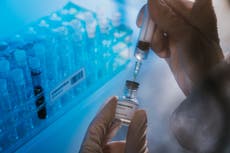Coronavirus: Oxford vaccine to be rolled out within weeks, and 70 million doses by Easter
Two-dose candidate found to be up to 90 per cent effective in preventing Covid-19
Four million doses of the vaccine developed by Oxford University and AstraZeneca will be available in the UK by the end of the year.
The two-dose candidate has been found to be up to 90 per cent effective in preventing Covid-19, with some indications that it can also block transmission of the virus.
The UK government, which helped to fund the development of the Oxford vaccine, has pre-ordered a total of 100 million doses to be shared between the four nations.
AstraZeneca said it expects that 70 million of these will be rolled out by the end of March next year – enough to vaccinate 35 million Britons.
From there, the pharmaceutical giant intends to deliver the remaining 30 million shots throughout the rest of the year.
Four million doses have already been manufactured and are ready to be administered throughout December, assuming approval is granted by the Medicines and Healthcare products Regulatory Agency (MHRA). This will allow two million Britons to be inoculated before the new year.
AstraZeneca estimates it will have produced “north of 300 million doses” worldwide by the end of March.
These figures do not include the supplies of vaccine that will be provided by AstraZeneca’s partners.
The Serum Institute of India, which struck a licensing agreement with AstraZeneca earlier in the year, has so far made 40 million and aims to increase this figure to 100 million by the end of December.
Pascal Soriot, CEO of AstraZeneca, said the Indian pharmaceutical – which is the largest vaccine producer in the world – has capacity to produce one billion doses of the Oxford candidate.
“We have a partner in Brazil who is manufacturing already. We have partners in America. We have another partner for Russia," Mr Soriot told a media briefing on Monday morning.
“Very soon we will see the entire global supply chain start to produce hundreds of millions of doses.”
The Serum Institute of India’s agreement with AstraZeneca dictates that it distribute its one billion doses among low and middle-income countries in the global south.
Alongside its partners, AstraZeneca is aiming to produce a total of three billion doses by the end of 2021.
“At the peak of our supply chain delivery, we are able to release anywhere between 100-200m doses per month globally,” said Pam Cheng, executive vice president of Operations and Information Technology at AstraZeneca.
These targets will be impacted by the decision of regulators over how to administer the two doses.
Trial results show that the vaccine is 90 per cent effective in preventing disease if administered at a half dose and then at a full dose, or 62 per cent effective if administered in two full doses.
If regulators such as the MHRA are satisfied with the statistical evidence, it’s expected authorities will move to adopt the half dose-full dose vaccination programme.
This will allow AstraZeneca to produce more doses for the first round of inoculation, meaning the company’s global supply chain could increase by 25 per cent, according to Ms Cheng.
"We have a robust supply chain which is capable of manufacturing at scale and we can do it very quickly,” she added.
“We're working with over 20 supply chain parters, contract manufacturing organisations ... to be able to manufacture up to three billion doses of this vaccine,” said Ms Cheng.
“The supply chains were set up in not competing ways on purpose to make sure we have broad and equitable supply, which from day one was a huge priority for all of us.”
Sarah Gilbert, professor of vaccinology at the University of Oxford, said: "The announcement today takes us another step closer to the time when we can use vaccines to bring an end to the devastation caused by (Covid-19)."
She said scientists are "optimistic" that the Oxford vaccine will offer durable protection, with other trials using the same technology showing a strong immune response maintained a year after vaccination.
On the trial results suggesting that a half dose-full dose vaccination programme would be sufficient to prime the immune system, Prof Gilbert said more work is needed.
But she added: "It could be that by giving a small amount of the vaccine to start with and following up with a big amount, that's a better way of kicking the immune system into action and giving us the strongest immune response."
Prof Gilbert said experts working on vaccines globally are not "thinking about vaccinations working in terms of one person at a time".
Join our commenting forum
Join thought-provoking conversations, follow other Independent readers and see their replies
Comments



Bookmark popover
Removed from bookmarks